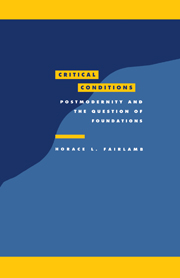Book contents
- Frontmatter
- Contents
- Preface
- Acknowledgments
- List of abbreviations
- Introduction
- 1 Fish's strong conventions: the mind's own world
- 2 Brave new words: postmodernism on epistemology
- 3 Theory and/or deconstruction: Derrida's slippage
- 4 Gadamer's universalism: the limits of hermeneutic authority
- 5 Critical politics: deconstruction for Americans
- 6 Foucault's microphysical politics: Big Brother is missing
- 7 Habermas' neo-formalism: theory as praxis
- 8 Critical theory and postmodern localism: rebels without a cause
- Conclusion
- Bibliography
- Index
8 - Critical theory and postmodern localism: rebels without a cause
Published online by Cambridge University Press: 01 June 2011
- Frontmatter
- Contents
- Preface
- Acknowledgments
- List of abbreviations
- Introduction
- 1 Fish's strong conventions: the mind's own world
- 2 Brave new words: postmodernism on epistemology
- 3 Theory and/or deconstruction: Derrida's slippage
- 4 Gadamer's universalism: the limits of hermeneutic authority
- 5 Critical politics: deconstruction for Americans
- 6 Foucault's microphysical politics: Big Brother is missing
- 7 Habermas' neo-formalism: theory as praxis
- 8 Critical theory and postmodern localism: rebels without a cause
- Conclusion
- Bibliography
- Index
Summary
Today, with theory paralyzed and disparaged by the all-governing bustle, its mere existence, however impotent, bears witness against the bustle. This is why theory is legitimate and why it is hated; without it, there would be no changing the practice that constantly calls for change. Those who chide theory anachronistically obey the topos of dismissing, as obsolete, what remains painful as thwarted.
Theodor W. AdornoThe problem of critical theory
Kant epitomized the revolutionary rationalism of the Enlightenment when he said, “Our age is the age of criticism, to which everything must be subjected.” The age's critical spirit led to revolutions in several domains: a technological revolution in the name of control over nature, social revolutions in the name of democracy, economic revolutions in the name of industrial and socialist economies, and cultural revolutions in the name of free inquiry, self-expression, and rational thought. The impact of these developments is difficult even to estimate; the modern world is a transformed world whose legacy cannot, in many ways, be undone.
Yet a number of challenges to modernism have placed its legacy in an ambiguous light. On the one hand, traditionalists such as Gadamer highlight the contingent and historical grounds of even rationalist thought, pointing to its roots in the prejudices of our ancestors. According to Gadamer, all thought is at once motivated and bound by historically conditioned ideas and commitments.
- Type
- Chapter
- Information
- Critical ConditionsPostmodernity and the Question of Foundations, pp. 233 - 254Publisher: Cambridge University PressPrint publication year: 1994



